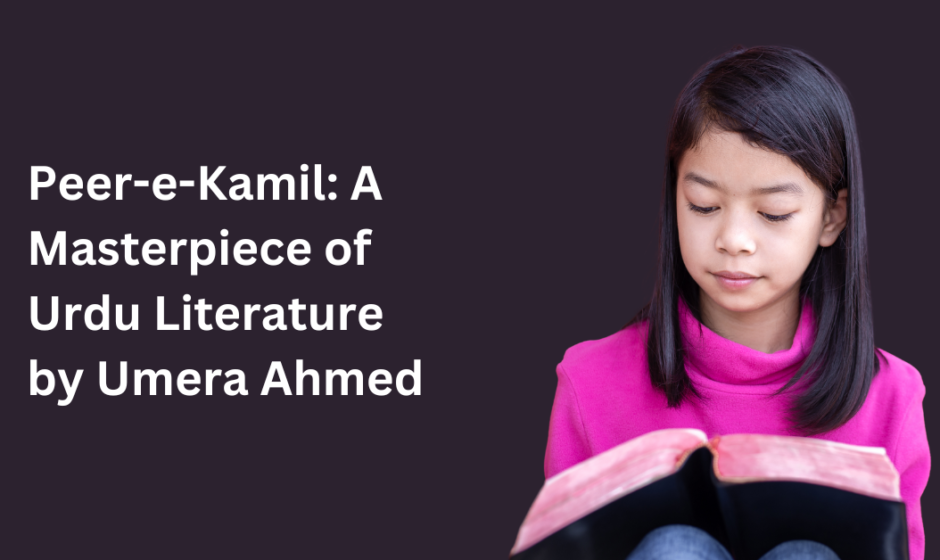When it comes to modern Urdu literature, Peer-e-Kamil by Umera Ahmed stands out as one of the most impactful and deeply emotional novels. Umera Ahmed, a name synonymous with engaging storytelling and thought-provoking themes, masterfully crafts a narrative in Peer-e-Kamil that delves into spirituality, redemption, societal challenges, and the profound search for inner peace. This novel has transcended its time to become a favorite for readers not only in Pakistan but across the Urdu-speaking world.
In this blog, we’ll explore the depths of Peer-e-Kamil, its characters, and the major themes that make it a must-read for anyone interested in Urdu fiction.
About Umera Ahmed
Before diving into the novel itself, it’s essential to understand Umera Ahmed’s background and influence on Urdu literature. Born in Sialkot, Pakistan, Umera Ahmed began her writing career with short stories before moving to novels and screenwriting. Her works often revolve around complex emotional and moral dilemmas, particularly focusing on religion, spirituality, and the clash between modernity and tradition. Her writing has played a significant role in shaping modern Urdu fiction, making her one of the most widely-read contemporary authors.
Overview of Peer-e-Kamil
The title Peer-e-Kamil translates to “The Perfect Mentor” or “The Perfect Guide.” It represents a journey toward spiritual perfection, a theme central to the novel. Published in 2004, Peer e Kamil PDF was met with both critical acclaim and widespread popularity. It became a cornerstone of contemporary Urdu fiction, known for its profound insights into human nature, faith, and redemption.
Plot Summary
At its heart, Peer-e-Kamil tells the story of two individuals, Imama Hashim and Salar Sikander, whose lives are intertwined in ways they could never have imagined. The novel follows their separate yet connected journeys, focusing on their struggles, growth, and eventual transformation.
Imama, a young woman born into a rigid sect of Islam, finds herself questioning her faith. Her search for truth leads her to the teachings of mainstream Islam, resulting in a personal crisis. Salar, on the other hand, is a brilliant yet troubled young man with a deeply flawed moral compass. The novel traces the evolution of these characters as they navigate faith, societal pressures, and their internal battles.
Main Characters
Imama Hashim
Imama Hashim is a central figure in Peer-e-Kamil. Raised in a highly conservative family, she struggles with her identity and religious beliefs. Her character arc is one of faith, courage, and self-discovery. Imama’s journey is marked by her decision to leave behind her family and its religious sect to follow what she believes is the true path of Islam.
Salar Sikander
Salar Sikander is an exceptionally intelligent yet morally conflicted individual. His brilliance is overshadowed by his self-destructive tendencies and an apathetic view of life. Over time, his interactions with Imama and his own experiences lead him toward a path of self-redemption and spiritual awakening.
Themes in Peer-e-Kamil
Religion and Spirituality
Religion is a driving force in the novel, but it’s not depicted in a simplistic or preachy manner. Rather, Umera Ahmed uses the characters’ struggles to explore deeper spiritual questions. Both Imama and Salar experience crises of faith, and their journeys toward spiritual enlightenment form the core of the novel.
Redemption and Transformation
The concept of redemption is central to Peer-e-Kamil. Salar’s character, in particular, embodies the idea that even the most lost individuals can find their way back to goodness. His transformation from a nihilistic young man to someone seeking spiritual and moral clarity is one of the most compelling aspects of the story.
Societal Critique
Umera Ahmed subtly critiques societal norms, especially regarding religious intolerance and the role of women. Through Imama’s experiences, the novel addresses the pressures women face in conforming to rigid family and societal expectations.
Love and Relationships
While Peer-e-Kamil does explore love, it’s not the typical romantic love found in most novels. Instead, Umera Ahmed delves into love as a form of spiritual connection. The bond between Imama and Salar transcends the physical and material, representing a higher form of love rooted in faith and understanding.
The Journey of Imama Hashim
Imama’s journey is one of the most poignant parts of Peer-e-Kamil. From her initial doubts about her family’s religious beliefs to her eventual conversion to mainstream Islam, Imama’s struggles reflect a broader search for truth. Her courage to stand against her family and her determination to follow her faith highlight the strength of her character.
The Transformation of Salar Sikander
Salar’s transformation is perhaps the most dramatic arc in the novel. Initially portrayed as arrogant, reckless, and morally bankrupt, Salar’s character evolves significantly as he confronts the emptiness of his life. Through a series of life-altering experiences, Salar slowly begins to understand the value of faith, morality, and compassion.
Symbolism in Peer-e-Kamil
Umera Ahmed uses various symbols throughout Peer-e-Kamil to enhance the story’s depth. For example, the name “Salar” itself, which means “leader” or “commander,” symbolizes Salar’s eventual role as a spiritual leader for himself and others. The novel is filled with metaphors that reflect the characters’ internal struggles and the broader themes of redemption and enlightenment.
Philosophical Depth of the Novel
At its core, Peer-e-Kamil is a philosophical novel. It poses questions about destiny, free will, and the purpose of life. Through the characters’ journeys, Umera Ahmed invites readers to reflect on their own beliefs and the nature of spiritual fulfillment.
Reception and Impact
Peer-e-Kamil was met with immense praise upon its release, and it continues to resonate with readers today. The novel has been particularly popular among young readers, many of whom find themselves grappling with the same questions of faith, identity, and purpose that the characters do.
Peer-e-Kamil’s Role in Pakistani Society
One of the reasons Peer-e-Kamil continues to hold relevance, especially in Pakistan, is its reflection of contemporary social issues. The novel addresses themes like religious extremism, intolerance, and the personal struggles of individuals who seek to break away from societal norms. By doing so, Umera Ahmed provides readers with a mirror to Pakistani society, where religious identity can be a deeply divisive issue.
For Imama, the decision to leave her family’s rigid belief system not only symbolizes her personal quest for faith but also acts as a critique of the ways in which some individuals are forced to conform to religious practices they do not fully accept. Salar’s transformation, meanwhile, addresses the emptiness that can accompany material success when it lacks a moral or spiritual foundation. These messages resonate strongly in a society grappling with questions of personal freedom, religious expression, and identity.
Cinematic and Media Adaptations
Peer-e-Kamil has not yet been adapted into a film or television series, although its immense popularity and complex characters make it a strong candidate for such adaptations. The novel’s deeply spiritual themes and intricate character arcs pose challenges for a screen adaptation, but there is a significant potential for success if it is approached with the right sensitivity.
One of the main challenges in adapting Peer-e-Kamil would be capturing the novel’s rich internal dialogues and the characters’ spiritual journeys in a visual format. Much of the novel’s depth comes from the characters’ internal struggles, especially Salar’s transformation, which might be difficult to portray onscreen without losing the subtlety of Umera Ahmed’s writing.
Why Peer-e-Kamil Stands Out
Among Umera Ahmed’s vast body of work, Peer-e-Kamil stands out for several reasons. First, its unique exploration of spirituality and personal redemption sets it apart from conventional Urdu fiction, which often focuses on romance or social issues. Peer-e-Kamil weaves together personal stories with larger philosophical questions about the purpose of life, the nature of faith, and the possibility of change.
Second, the characters in Peer-e-Kamil are multidimensional and deeply flawed, making them more relatable to readers. Both Imama and Salar are portrayed with a level of complexity that draws readers into their world and makes their eventual transformations all the more powerful. Umera Ahmed does not shy away from depicting their mistakes and weaknesses, but she also shows that redemption is possible for everyone.
Lastly, the novel’s timeless relevance continues to draw in new readers. Despite being written nearly two decades ago, the themes of self-discovery, societal expectations, and the search for meaning are just as pertinent today as they were when the book was first published.
Conclusion
Peer-e-Kamil is more than just a novel—it is a deeply philosophical and spiritual journey that takes readers into the hearts and minds of two complex characters. Umera Ahmed has crafted a narrative that explores the most profound questions of existence, faith, and personal transformation while also telling a compelling story of two people whose lives become intertwined.
The novel’s continued popularity speaks to its ability to resonate with readers on a deep emotional level. Whether you’re reading it for its spiritual insights, its critique of societal norms, or simply to enjoy a well-told story, Peer-e-Kamil offers something for everyone. It remains one of Umera Ahmed’s most celebrated works and a must-read for anyone interested in Urdu literature.
FAQs
What is the central message of Peer-e-Kamil?
The central message of Peer-e-Kamil revolves around the themes of spiritual awakening, personal transformation, and the quest for redemption. It explores how faith and inner strength can help individuals overcome their darkest moments and lead them toward a path of self-improvement.
Is Peer-e-Kamil based on real-life events?
While Peer-e-Kamil is a work of fiction, the themes and experiences of the characters reflect real-life struggles faced by many people in terms of faith, societal pressure, and personal growth. Umera Ahmed draws on universal experiences to make the novel relatable to readers from all walks of life.
How does Peer-e-Kamil compare to Umera Ahmed’s other novels?
Peer-e-Kamil is often regarded as Umera Ahmed’s most significant and impactful novel. While many of her works explore themes of morality, faith, and redemption, Peer-e-Kamil stands out due to its intricate character development and profound spiritual journey. Novels like Meri Zaat Zarra-e-Benishan and Shehr-e-Zaat also tackle similar themes but with different narrative styles and focus points.
What are some key quotes from Peer-e-Kamil?
Peer-e-Kamil is filled with powerful and thought-provoking quotes. Some of the most memorable lines include:
“Tumhe yakeen nahi hai kay tum jo maangtay ho woh tumhe diya jayega.” (You do not have faith that what you are asking for will be given to you.)
“Meri zindagi ka asal muqadma tau tab shuru hota hai jab insaan apni ghaltiyon ko ghalti maan le.” (The real trial of life begins when a person acknowledges their own mistakes.)
“Insaan ki azmat us kay amal main hoti hai.” (The greatness of a person lies in their actions.)
Is there a sequel or continuation to the story of Peer-e-Kamil?
Yes, Umera Ahmed wrote a sequel to Peer-e-Kamil titled Aab-e-Hayat. While Peer-e-Kamil focuses on the spiritual journeys of Imama and Salar, Aab-e-Hayat picks up their story after the events of the first novel and explores their lives further, delving into the next stages of their personal and spiritual growth.
In conclusion, Peer-e-Kamil remains a monumental work in Urdu literature, blending deep philosophical musings with a gripping narrative. Through its exploration of faith, redemption, and personal transformation, Umera Ahmed’s novel continues to inspire and resonate with readers around the world. Whether you are new to Urdu fiction or a seasoned reader, Peer-e-Kamil is an unforgettable experience that will stay with you long after the final page is turned.
https://fastpanda.in/



